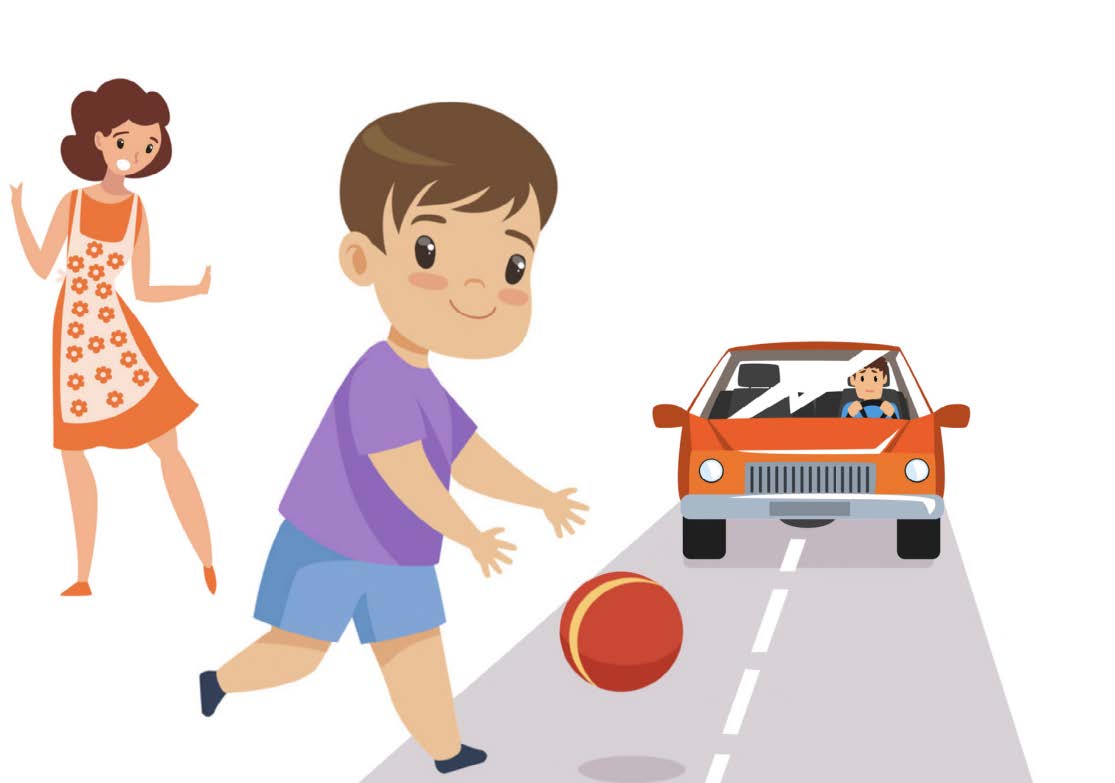ISSUES FACING PARENTS OF CHILDREN WHO ARE DEAF
BY TERI YUNUS
In 1985, when my third son was born, routine hearing testing was not being done in hospital for newborns. Michael was a good baby, likely due to being the third boy and having two brothers who made sure all his needs were met with the slightest squeak. He was a quiet baby, and I remember telling my friends that he was such a good sleeper that I could vacuum under his crib during his nap and he slept right through the noise.
As he grew, his frustration grew with him. He would point at things he wanted, there was no verbal communication other than grunts or cries. I often would empty out the kitchen cupboards to locate the item that he wanted. The pediatrician said he would talk when he was ready. His brothers and I doted on him, so why should he talk? When he was two years old, on a beautiful fall day, we were all playing ball in the front yard.
The ball was thrown into the street and Michael went after it. I saw a car coming toward him and I yelled loudly for him to stop. I knew instantly that he did not hear me. Luckily, the car saw this little one and stopped in time for me to retrieve him. I packed up all the kids and drove straight to the doctor's office. I demanded a hearing test and, no surprise, Michael was profoundly deaf.
By that time, I was a single mom with three boys, ages six and under. What did I know about raising a son who was deaf? He was the first deaf person I ever met. The local school district, at the time, provided an Early On program for kids with special needs. We had the assessments done through the school system and were lucky enough to have a teacher come to the house to work with Michael and me. She taught us some sign language words so we could finally begin to communicate in a meaningful way. Debbie was fantastic, I will never forget her kindness and willingness to help. She was a lifeline for us then, and when Michael was just three years old, he went off to school. I still remember putting him on the bus when he was so little and so cute. By then, he had hearing aids and I would pin them with a string to his shirt so he didn't lose them. He still managed to lose many sets over the years.
Michael attended the deaf class at the local elementary school where he had four to five classmates. Some of his closest friends were in that class, and he remains in touch with a couple of them over 30 years later. His teacher in the earliest years who worked very well with the kids used sign language and taught social skills. Michael went on to a mainstream classroom when he was about seven years old. He did well in the beginning with special seating and an interpreter. Yet, he was always the outsider. His only method of knowing what was happening in the classroom was through his interpreter; that left him isolated and, over time, unhappy. His memory now at age 35 of his mainstream years is that of the one friendship with a hearing boy, Kyle. Kyle made the effort to befriend him. One hearing classmate. Just one. Of his experience in mainstream elementary he says otherwise, "It's not cool to go there."

SILENT SCARE: Luckily, the car saw this little one and stopped in time for me to retrieve him.
BEST DECISION
When he was 10, I started pushing the school system to allow him to attend the state school for the deaf. It was a battle. I fought for about a year and a half and I will never forget the call I received on Christmas Eve that year. The fight was over. They approved his attendance and, at age 11, after Christmas break, Michael moved into the dormitory at the school that was over an hour away from our home. It was the hardest but the best decision I ever made for Michael. He was no longer the outsider. His "dorm" was a standalone house on the school property where five other little boys lived with the houseparent. It was homey and Michael shared a room with another boy his own age. One of my most profound memories is that Michael began wearing out the knees in his jeans after he moved to the school. He was now playing like a normal kid and his clothing was evidence of his inclusion. I still tear up thinking about it. He became a happier kid overnight.
The years leading up to the move to the school for the were not easy. Michael "living" away at school offered a whole new set of challenges. I was a single parent working multiple jobs to provide for my kids. My other sons often felt like secondary citizens as Michael's needs were greater than theirs. They were independent and probably had too much freedom because I was either working or attending a school event over an hour's drive away. The boys and I all took sign language classes during almost all the years of raising Michael. When the kids were young, I did my best to provide sitters who had sign language skills. Two of our longer-term sitters were fluent signers, one had deaf parents and the other was deaf herself.
One of our neighbor girls taught herself sign language with books from the library (pre-internet days) and went on to earn her degree in Deaf Education. Looking back, it was a real challenge in many ways raising a child "Allow your child to be different and unique while including him as much as possible in every conversation. Use signs whenever your child is present. This is inclusion." who was deaf in a hearing family. Children learn so much via incidental learning and, without it, every single thing must be taught. At one point, everything in the house was labelled…signs on the door, the windows, the curtains, the coffee pot, the blankets. Every word had to be taught as Michael did not have the benefit of hearing these words over and over like hearing kids do. It is something most people have no concept of – one of the things most of us take for granted.
I was astounded when I realized when Michael was nine years old that he did not realize that my mom was his grandma, and my sister was his aunt. He did not know this because he had not been taught this concept that we all "just know." It blew my mind. I felt inadequate as a parent of a child with different needs. I felt overwhelmed intermittently while raising Michael. I now can look back and give myself the grace that I wish I had allowed myself then. Ninety percentage of deaf children are born to hearing families. Most of us are unequipped to make the big decisions. When my son was little, cochlear implants were in the experimental stages and were not an option for him. He wore hearing aids over the years and finally, at age 15 when I found that he was using them as expensive earplugs, he stopped wearing them all together. They did not help him hear voices and were a significant distraction for him. He still finds high pitched, loud noises painful.
COMMUNICATION IS KEY
I often wondered had Michael been given hearing aids earlier in life, if he would have been less hypersensitive to sound. I will never know if the delay contributed to this. My recommendation is to get hearing aids as soon as you know there is a hearing deficit that is significant enough to require them. Sign language and new technology changed my son's world. Cell phones have made connection with friends so much better. When he was in school, his friends were spread over hundreds of miles, and play dates were a huge deal, but we did it. We did the best we could to ensure some level of "normalcy" for our family and for Michael.
Bottom line for new parents of deaf children is that communication is number one. Learn sign language as soon as you learn your child cannot hear. Use your voice when you sign and be expressive in your facial appearance. Access to learning sign language is so abundant now. There are many free American Sign Language options available online. Know that it will all feel awkward and uncomfortable, and you may wish that your child was "normal" like the other kids. Your child has a different normal. Michael has always said that the only thing he cannot do is hear. Otherwise, he is our "normal".
Allow your child to be different and unique while including him as much as possible in every conversation. Use signs whenever your child is present. This is inclusion. Talking to another person while your child is present without signing is excluding the child. This can be a tough one for many hearing people. It is imperative for the sense of belonging that is sometimes absent for a deaf child in a hearing family. That may be your biggest challenge. It has been for us.
YOUR INTUITION WILL GUIDE YOU
The best advice I can offer is to listen to your heart. Your intuition, your gut wisdom will guide you. If recommendations are made for your child that do not sit right with you, do not agree to proceed. Your body will tell you if you listen. Pay attention to what comes up in your body when recommendations are made. If you feel excited and hopeful, that's a great sign. If you feel reluctant and feel like you need time to think about it, that is your no.
Getting help will make your life less chaotic. Seek help from your doctor, your local health department, the school system, social media groups and on the web. Knowing that people may be very opinionated and "know" what is right for your child may help you understand that they are truly trying to support you but, ultimately, you are the parent and your wisdom is the best guide. •
ABOUT THE AUTHOR:

Teri Yunus is a Family nurse Practitioner and nationally board-certified health & wellness coach with health up with teri! she recently retired from her work as a nurse practitioner and devotes her time to coaching with emphasis on transitioning to a whole food plant-based lifestyle. she empowers her clients to take their power back and the results she sees with her clients is transformative! healthupwithteri.com contact teri at healthupwithteri@gmail.com